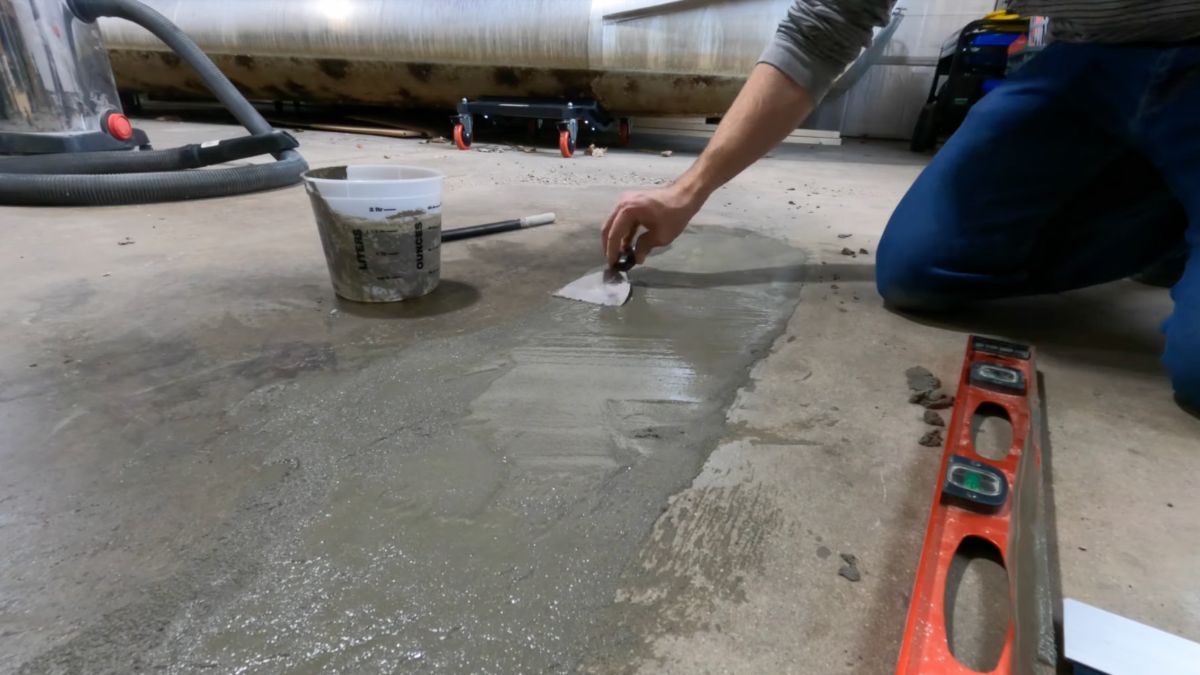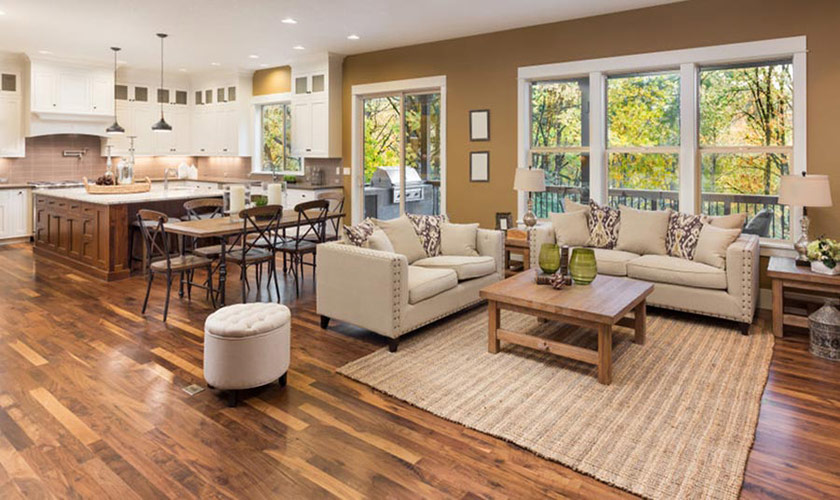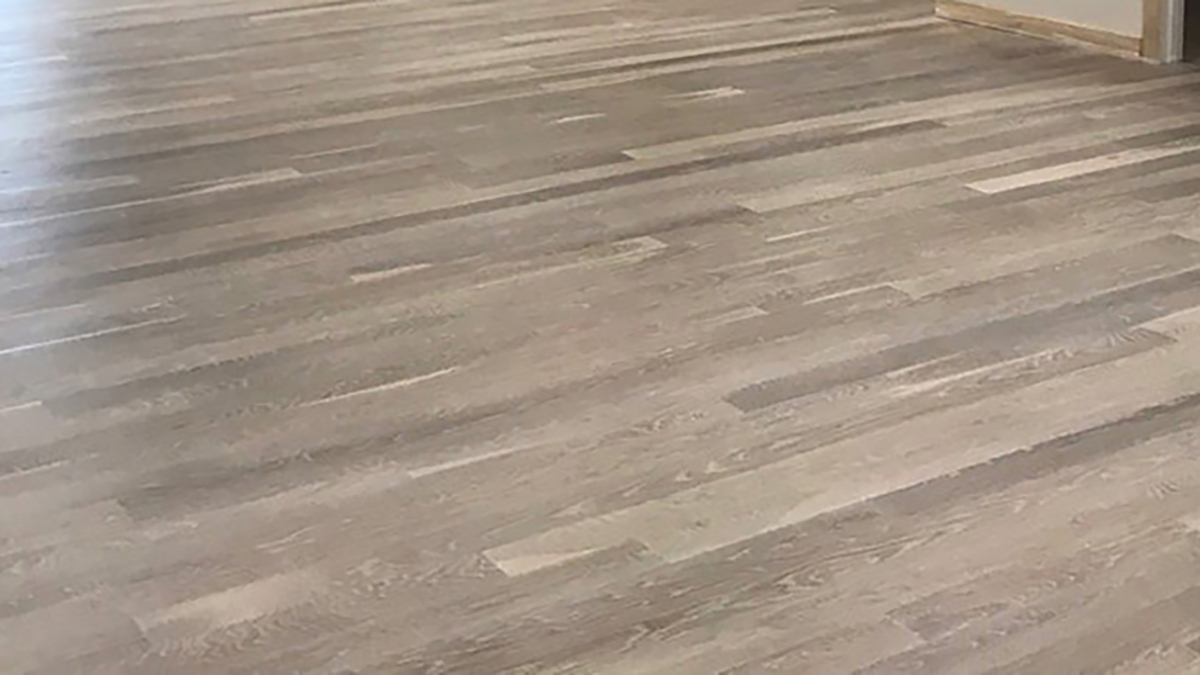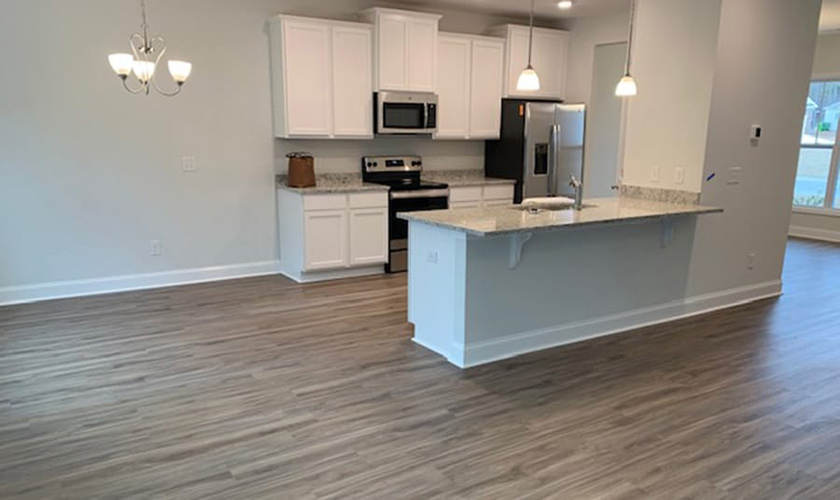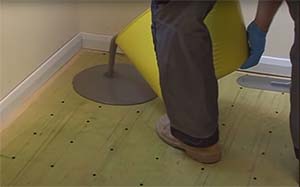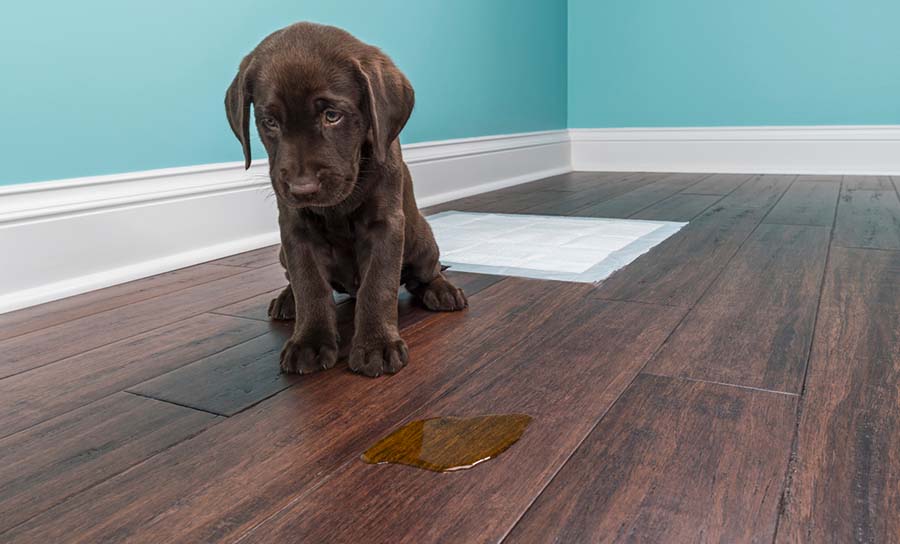
When you have your own home, there are several things that you will start to stress about, with the quality and beauty of your floors usually being near the top. If you have hardwood floors, it will not take long for you to stress about how their urine may affect the beautiful wood you have.
Pet urine can and will easily damage your hardwood floors, no matter where they are in the house. Most pet owners risk permanently damaging their hardwood floors when their pet urinates on the floor. Pet urine is one of the most destructive fluids that can naturally spill onto your hardwood floor.
You will need to understand just how the urine will damage your floors from your loved pets and how you can work to protect your floor as much as possible. We have seen many people make simple mistakes or assuming that it is fine, only to end up with permanently damaged hardwood floors.
What Happens When a Pet Urinates On Hardwood Floors?
To understand why it is so bad for your pet to urinate on your hardwood floors, we first need to establish what happens with the urine once it lands. Several things are easy to predict and several problems that will damage your hardwood floors in irreparable ways.
We always like to remind everyone about these things when they keep their pets inside their homes, especially if you cannot train them to use the restroom outdoors. You can train most normal house pets quickly to only urinate at certain places, but there will be short periods of random urinating across the floor.
1. Rotting
The sneakiest and most problematic thing that starts to happen when your pet urinates on your hardwood floor is the rotting that begins to take place. Because no hardwood floor is perfectly sealed, some of the urine will leak through, sitting in small puddles beneath the floor.
You cannot simply reach these spots, and because they do not dry out, the wood around them starts to rot as bacterial growth increases. This is a slow and deadly thing that will happen to your hardwood floors that will usually require that you replace most if not all of the floor to fix it.
2. Mold Growth
Much faster than the spread of your wood rotting, you will find that there will be some mold growth in spots where the pets are urinating a lot. If you catch it in time, you can prevent this, but it can be deadly as black molds tend to grow the fastest once your pet starts to urinate on your floor.
People often assume that black mold is just some type of stain or dirt that has gotten stuck that will be easy to kill. However, these molds are usually dangerous once you breathe them in, making them dangerous to have around the house and even more dangerous when trying to clean.
3. Stains
When you have pets in your home, you should never forget that their urine will eventually stain your hardwood floor. Urine must be on the floor for a while to form a stain, as the wood usually has a layer of protection.
These stains can be a headache to deal with depending on their severity, with stains that are only surface-level easy to stain or sand away. However, if the stain is too large and deep, you must replace the stained boards because they are beyond repair.
4. Leaking
This is what causes the larger issues with urine on hardwood floors; the floor is not made to withstand water in this manner. Hardwood causes the urine to eventually leak through the floorboards, leaking down to the basement, the crawlspace, or just sitting beneath the surface of the floor.
The urine leaking into other places of your house is one of the big reasons that people need to replace their hardwood floors. Many assume that the urine will not leak into crevices or any other part of the home, thinking it will always be surface level.
5. Cracking and Warping
The thing that no one ever expects to happen to their hardwood flooring is cracking while warping as common as the floor is. Pet urine can cause some parts of the floor to start warping and bending, while other parts that were only urinated on once will start to crack as they lose their protection.
Many homes that have not been properly cared for will have hardwood flooring that is warped beyond recognition and has cracks. A hardwood floor that has started splitting and cracking will need to be replaced entirely to have the best results.
6. Smell
Apart from the damage done to the floor, a much more immediate and sinister thing will start to happen with pet urine on hardwood floors. Because of the cracks and the tendency for the floor to absorb moisture, the smell will slowly start to worsen over time.
Eventually, the house will be permanently stuck with the smell of urine as the hardwood floors have absorbed the smell, and it cannot be washed or sanded away. Once the floor has absorbed this smell, you can do almost nothing short of ripping apart most of the house to eliminate it.
What Affects Do Different Pet Urines Have On Hardwood Floors?
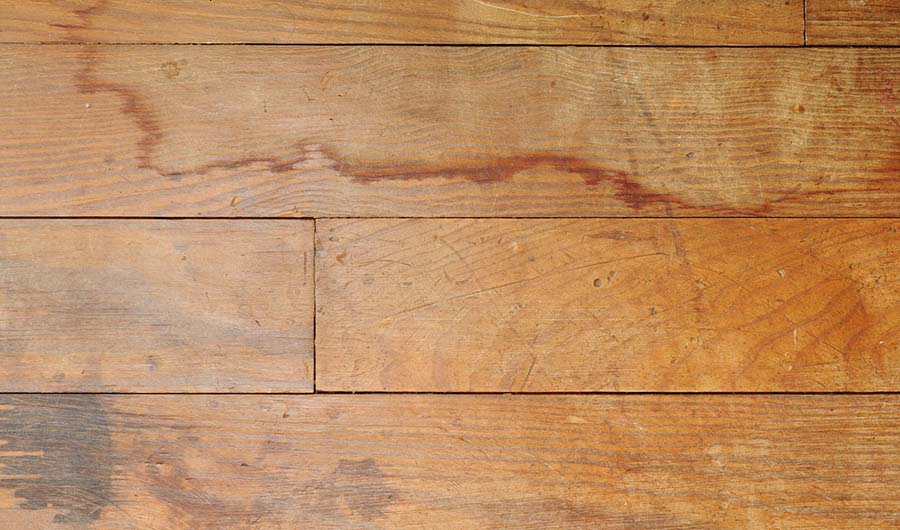
If the world were a simple place, all pet urine would have the same effect on your hardwood floor, and the solution would be simple. However, the world is very rarely simple, and each type of pet urine will have a different effect on your hardwood floor, requiring that you do something different.
Below we’ll discuss the following pets and the effect that their urine can have on hardwood floors:
- Cats
- Dogs
- Rabbits
- Reptiles
The larger your pets are, the more their urine will promote rotting and staining, while smaller animals have much more potent urine overall. It is important to understand how your pets’ urine will react with the floor, as this will allow you to react with the right cleaners and treatments.
Cats Urine on Hardwood Floors
Cat urine is one of the strongest smelling urines of the mammals that are usually kept as pets that you will find. These small, cute furballs do not produce an excessive amount of urine each time they go, but they have much stronger kidneys than other mammals.
This means that their urine is packed with a lot more toxins and chemicals than other animals, which means that their urine has a stronger smell. If left alone, their staining power, rotting power, and smell will become dangerous, causing severe sickness to anyone living in the house.
Dogs Urine on Hardwood Floors
Dog urine can negatively impact your hardwood floors, and while there are things you can do to protect your floors, the best option is to ensure your dog is properly potty trained.
Dogs have urine that can differ greatly from each size of the breed that you can find in the world; however, their urine may not always immediately smell as bad. The challenge with dog urine is the quantity; while a chihuahua may not urinate a lot, larger breeds like retrievers certainly will.
This means that your dog may urinate only a few times on your hardwood floors and end up causing puddles, rot, smell, stains, and warping on those locations. It is always recommended to have a dog fully potty trained for the house before taking them anywhere near the hardwood floors.
Rabbit Urine on Hardwood Floors
We include rabbits because they have become more popular animals to keep apart from traditional animals. These adorable pets hide away the fact that they can be extremely high maintenance, and we always recommend not keeping them in homes with hardwood flooring.
However, if you keep them, remember that rabbits do urinate a lot more than other animals while they are small. This is because their bodies are extremely active, and their metabolism works faster than other pets, causing them to use the bathroom more often, which can be catastrophic on hardwood floors.
Reptiles Urine on Hardwood Floors
One of the most challenging types of pets you can keep in any home belongs to the reptile family. They will usually only urinate a few drops at a time and be almost impossible to track when and where they have gone, which causes challenges with them with the floor.
These pets are very unlikely to damage your hardwood floors, as they cannot produce enough urine to eat through the hardwood floor’s protection. However, their urine can be dangerous if left to dry and cause severe sickness if you are not careful with how it spreads.
Other Animal Urine on Hardwood Floors
Each type of animal you can keep as a pet in your home will have different effects on your hardwood floors. We always recommend having your animals secluded away from the hardwood until they are potty trained to prevent you from finding out just how hard it can be to clean urine.
You can keep many animals around the world as pets that will run around freely, all the way from otters to cheetahs. You should be able to clean most of these animals’ urine from your hardwood floors, with all urine damaging the wood somehow.
What Are The Health Risks Of Pet Urine On Hardwood Floors?
Everything from respiratory infections to bacteria that can and will cause rashes across your body can be found in the urine of your pets. If not disposed of properly, the urine and feces of your pets can have the same bacterial and virus growth that human feces have.
While it is usually joked about and taken lightly, pet urine can be extremely deadly to those with even mildly weakened health. It is the responsibility of the pet owners to ensure that the risks and damages of urine from the pets are not felt or causing any long-term damage.
It is not simply good enough to wipe away the urine with a few paper towels; you will have to wash the spot it was in and then thoroughly wash your hands. You must train your pet to urinate where it is safe and healthy for the ground or plants to absorb the urine.
How Do You Keep Pet Urine From Damaging Hardwood Floors
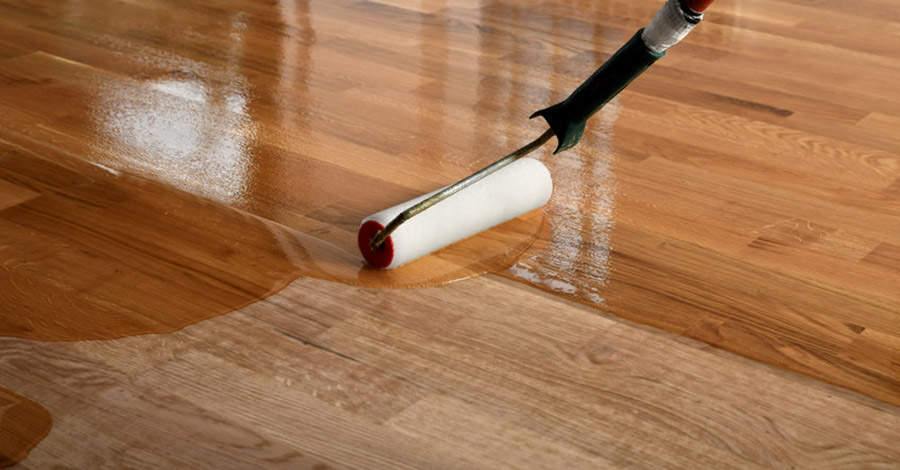
While it would be wonderful to have your pets never urinate inside of your home on your beautiful hardwood floors, we all know this is not always possible. Any pet owner will tell you that the potty-training exercise took a lot of time and caused a lot of laughs.
As much as we would all want to at times, our pets have minds of their own and can be so excited that they lose control. When this inevitably happens, it’s important to have already taken preventative measures and safeguards to help your hardwood fools resist urine damage.
Waxes
The best way to protect your hardwood floor from any damage, whether scratches, dings, spills, or urine, is with a proper wax. Unlike other treatments, when you apply a proper level of wax on your floor, it creates a protective barrier against things that can damage your floor.
While they don’t always look the best, a good hardwood floor wax will give you some ease of mind if your pet does accidentally urinate on your floor. It is always best to have the floor waxed in such a way as to ensure that the urine cannot reach the wood before you can clean it up.
Stains
A wood stain works on the principle of having the wood absorb it instead of other fluids, creating barriers that will protect your flooring. In contrast, it is not always the best way to protect your hardwood floor from pet urine; it can serve the purpose of keeping it safe for a short while.
However, you will need to sand and re-stain the hardwood floor once the pet has learned where to urinate and where not to urinate. We always recommend that you have something above the floor to protect it if you know that your floors have been stained instead of waxed and polished.
Treatments
Modern technology means that we no longer need to rely on the oldest ways of protecting our hardwood floors from pet urine. Many treatments can be applied to hardwood flooring to make it stronger than normal, saving the floor from the worst urine stains.
Choosing the proper treatment for your hardwood floor can be extremely difficult as there are almost too many options out there. Some are waxed-based, some are entirely chemical, and others can be completely natural solutions; you will have to choose the best one for you and your situation.
Conclusion
Your pet will urinate on your hardwood floors, and it will be something that can cause a lot of damage if you treat it in the wrong way. However, if you plan and use the right floor treatments, you can comfortably have the floor stay unharmed right through potty training.
Please, whatever you do, don’t have a new puppy live primarily where the hardwood floors are; that will never work out well!


